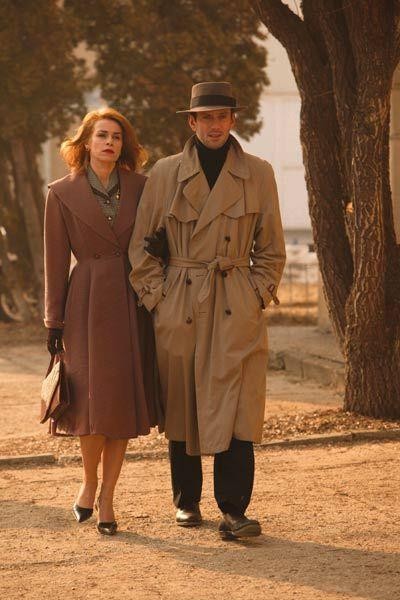
A PLACE AMONG THE LIVING (UNE PLACE PARMI LES VIVANTS)
France, 2003, 103 minutes, Colour.
Christian Vadim.
Directed by Raoul Ruiz.
A Place Among the Living is a mixture of thriller and existentialist drama. It begins with a death (accident or suicide) of an artist who has lost confidence in himself. The film moves to the callous attitudes of those who knew the artist and think merely of themselves and how they can profit by his death. The focus of attention then is a writer who lacks imagination, is very good at translations, but who is approached by a criminal to write a fictionalised account of his serial killings. There are several twists as regards identity, who perpetrated the crimes, who is using whom. There are also a number of deaths, resulting in the writer and the artist coming together as ghosts at the end of the film reflecting on what has happened.
The setting is the late 50s, Paris café society, the world of the arts and publishing. The film is satirical in its presentation of the attitudes of some of the cultural people. It also focuses on the tangles of relationship. In the background are references to existentialism, the writings of Sartre and Camus with posters of films with Brigitte Bardot.
Raoul Ruiz became rather more prolific at the end of the 1990s, with a film a year, varying in styles and content. Here, he explores a particular aspect of Parisian society with a great deal of aplomb, suggestions for intellectual reflection, involvement emotionally in the intriguing circumstances.
1. The title? Who was living? Who was dead? The nature of Parisian society at the end of the 1950s?
2. The re-creation of Paris at the times, the apartments, cafes, publishing houses? The streets? The muted tone of the colour photography? Light and darkness, day and night? The musical score? The jazz score and its predominance? The piano score?
3. The opening, Marc and his self-deprecation, Sabine as model listening to him, her anxiety about him being on the balcony? His death? The wine bottle not being broken? The film's action moving away from him, almost forgetting him? His reappearance at the end as a ghost, his wounds, drinking from the bottle?
4. The transition of focus to Ernest, the number of phone calls? Sabine and the information? The publisher? The mysterious voice? The invitation to meet him? Ernest and his being alone, his angst? Relationship with Sabine? His going to the opening, the discussion about his novel and the publisher saying it was bad? His moving around, meeting the older woman and the discussion about novels, mysteries, romance novels? His going to the meeting with the mysterious man, the explanation of his assignment, the envelope of money, the discussions with Roger? Going to the striptease club? Joseph and his going into a trance? The show, his leaving, the murder? Roger and his departure?
5. The impact on Ernest, the discussions with Joseph, the serial killings? His ability to write the fiction, having listened to Joseph? The attention to detail? The discussion with the publisher, his former relationship with her, her new relationship? His going to Christine, her reading the work, wanting it not just merely to be a murder mystery? Her wanting it to be fiction? Her suspicions? She making all the decisions? Wanting to publish?
6. Joseph, the continued visits, setting up the meetings, the cafes? Roger and his presence in the background? The continued murders? The brunette, her meeting with Ernest, talking about Lou Lou and his setting up the situation? Her later murder?
7. His continuing writing, his relationship with Sabine, his wanting her to do the striptease, her saying she couldn't? The irony of seeing the magazine with her photos? Her double life? Her carelessness, going to see her mother? Finally giving her the manuscript, her giving it to the wrong firm, the publisher's new boyfriend taking it as his own after hearing of Ernest's suicide? Her encounter with Joseph, seeing him as Lou Lou, her death?
8. Joseph and his personality, sinister, spying on Ernest and Sabine? The discussions about the novel? His finally shooting Ernest? Covering things up? The ghosts watching him do it? His meeting with Roger, their discussions, Joseph's change of personality, Roger emerging as the killer? Inviting Joseph to share in his experiences just as Joseph had invited Ernest?
9. The women at the club, their dancing, stripping? The discussions with Ernest? Their deaths? Sabine as part of this world? Making the appointment with Lou Lou just before she died?
10. Joseph as Lou Lou, the way the people talked about him, different from the personality the audience had seen on the screen? His setting up practical jokes, everybody liking him? The deadly irony?
11. The film exploring the world of the creative artist, imagination, the dangers as symbolised by the murders? Striptease mentioned as a metaphor for uncovering personality? The amoral world of the arts? The newspaper boy and his sensationalising the murder? The audience not seeing any of the police investigations?
12. The background of Sartre and Camus, existentialism and living only in this world, value of the moment? The irony of having ghosts? Their discussions about the afterlife, one not drinking, one not smoking, not meeting each other - and the day going over and over and over in each successive day?